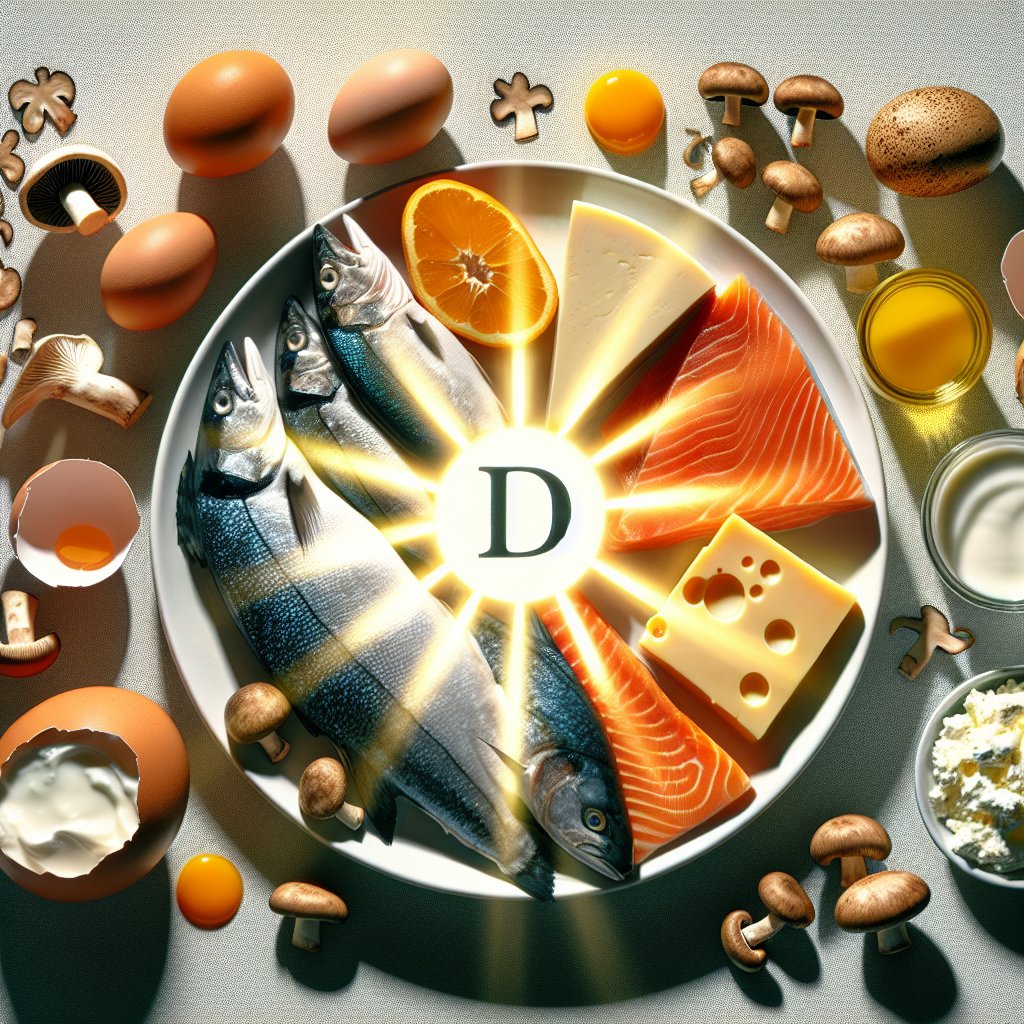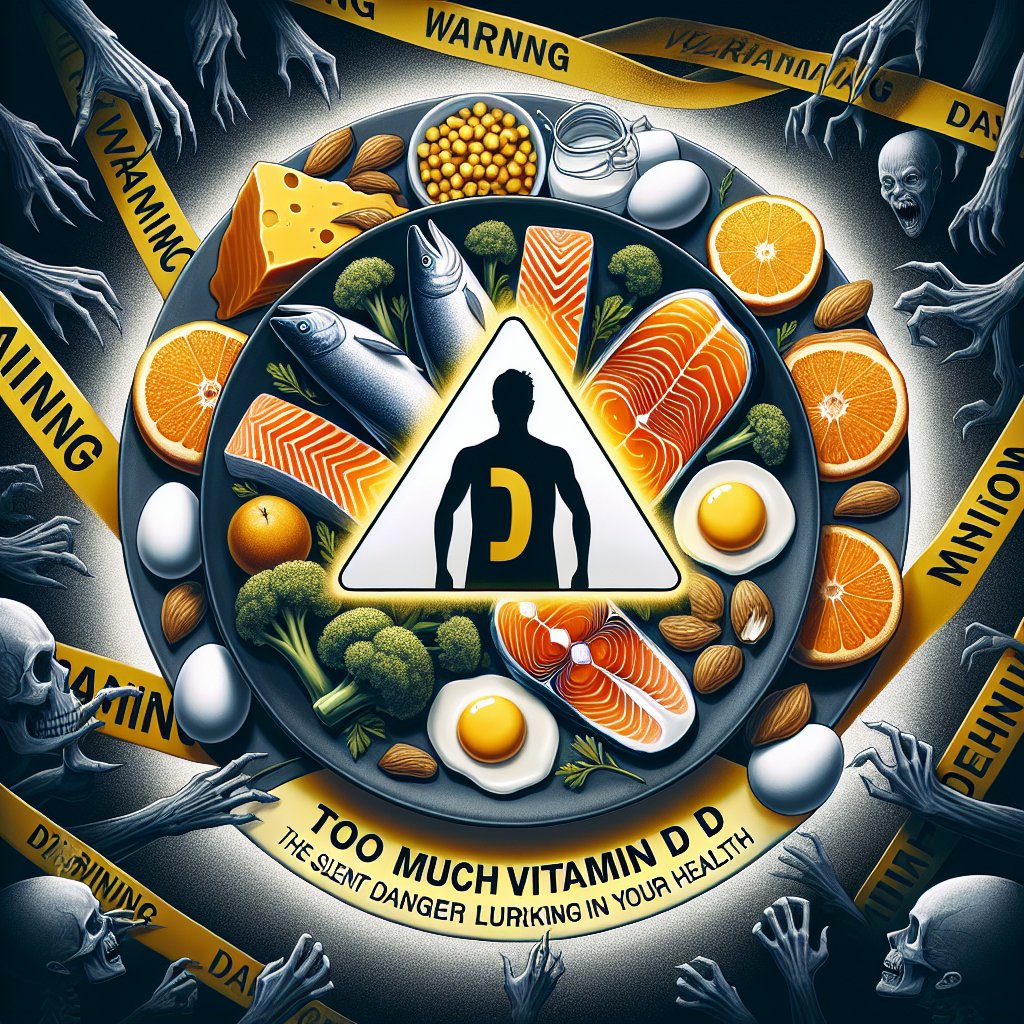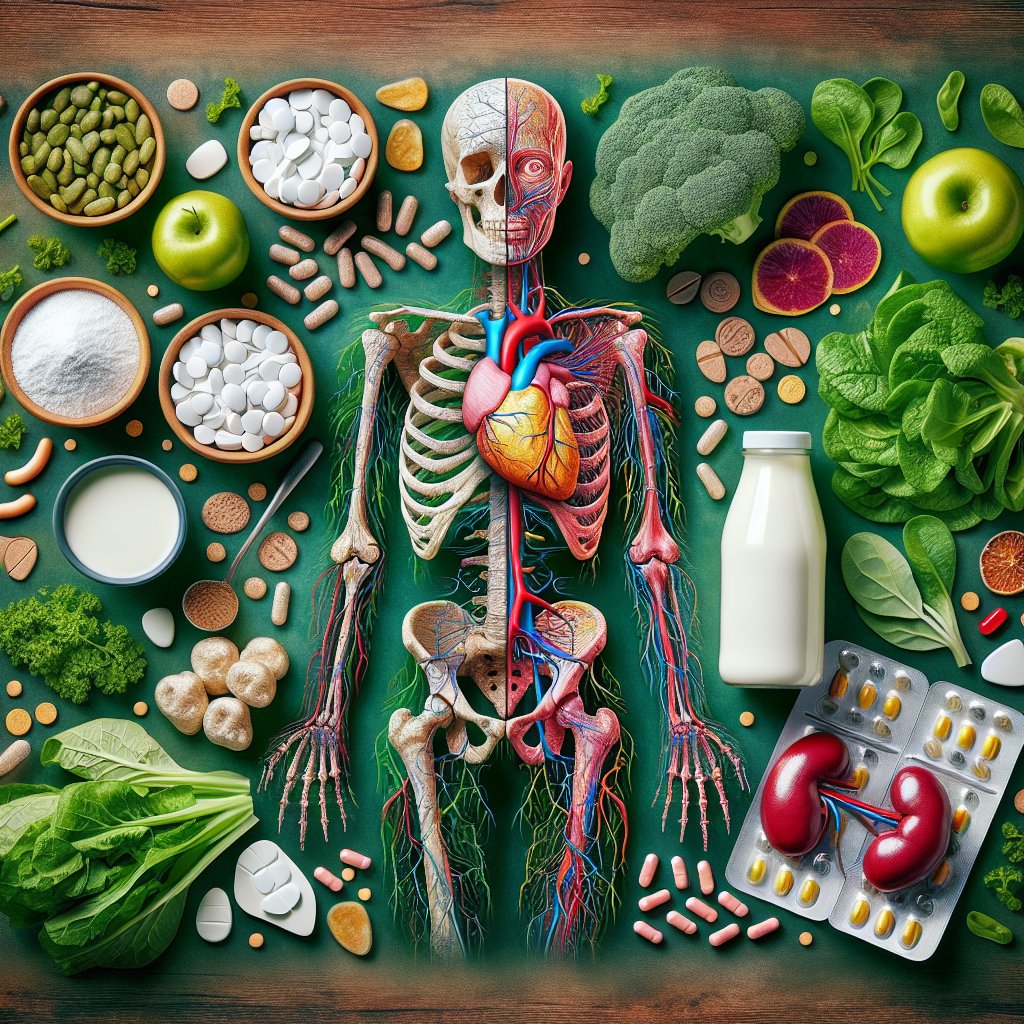Too Much Vitamin D: The Silent Danger Lurking in Your Health!
The Sunshine Vitamin: Understanding the Importance of Vitamin D
Welcome, lovely readers! Today, we’re going to delve into the fascinating world of Vitamin D. Get ready to uncover the secrets of the “sunshine vitamin” and its critical role in our overall well-being.
Definition and Significance of Vitamin D
So, what exactly is Vitamin D? Well, it’s a fat-soluble vitamin that acts more like a hormone within the body. One of its primary jobs is to help regulate the absorption of calcium, a crucial mineral for bone health. Vitamin D also plays a key role in supporting the immune system, promoting muscle function, and reducing inflammation. Plus, it’s been linked to mood regulation and mental health.
The significance of Vitamin D cannot be overstated. Research has shown that adequate levels of this vital nutrient are associated with a lower risk of chronic diseases, including heart disease, certain cancers, and even autoimmune conditions. Moreover, it’s essential for maintaining strong bones and teeth, especially as we age.
Sources of Vitamin D
Now, let’s talk about where we can find this amazing nutrient. The most natural way to get Vitamin D is through direct sunlight exposure. When the sun’s ultraviolet B (UVB) rays hit the skin, a chemical reaction occurs, triggering the production of Vitamin D. Pretty cool, huh?
Aside from the sun, you can also get Vitamin D from certain foods. Fatty fish like salmon, mackerel, and tuna are excellent sources. Additionally, egg yolks, cheese, and fortified products such as milk, yogurt, and orange juice can contribute to your Vitamin D intake.
For those following a ketogenic lifestyle, incorporating foods like fatty fish and egg yolks not only boosts their Vitamin D levels but also aligns with their low-carb, high-fat dietary goals.
Importance of Vitamin D for Overall Health
Now, let’s dive into why maintaining adequate Vitamin D levels is crucial for our overall health. Firstly, as I mentioned earlier, Vitamin D plays a vital role in bone health. It helps in the absorption of calcium and phosphorus, two minerals essential for building and maintaining strong bones.
Furthermore, Vitamin D has been found to modulate the immune system, potentially reducing the risk of respiratory infections and other diseases. And let’s not forget its impact on mood and mental well-being. Research suggests that maintaining optimal Vitamin D levels may help manage symptoms of depression and anxiety.
So, if you’ve been feeling a bit down or low on energy, it might be worth checking your Vitamin D levels!
In conclusion, Vitamin D is truly a superstar nutrient. Whether it’s soaking up some sun, enjoying a delicious piece of grilled salmon, or sipping on a glass of fortified almond milk, there are plenty of enjoyable ways to ensure you’re getting enough of this essential “sunshine vitamin.” Let’s bask in the glow of good health together!

Understanding Vitamin D Toxicity
Hey there, lovely readers! Today, I want to talk about something really important: Vitamin D toxicity. Yes, you read that right! While we often hear about the dangers of vitamin deficiencies, it’s equally crucial to be aware of the potential risks of overdoing it with this essential nutrient. So, let’s delve into the details of what Vitamin D toxicity entails, what causes it, and how to recognize its signs and symptoms.
Definition of Vitamin D Toxicity
First things first, what exactly is Vitamin D toxicity? Well, it occurs when there is an excessive amount of Vitamin D in the body, leading to potential health risks. Typically, this happens when vitamin D levels in the blood become too high, a condition known as hypervitaminosis D.
Vitamin D is crucial for various bodily functions, including calcium absorption, bone health, and immune system support. However, like most good things, too much of it can lead to negative effects. In the case of Vitamin D toxicity, the body’s calcium levels can become dangerously elevated, resulting in adverse health outcomes.
Causes of Vitamin D Toxicity
So, what causes Vitamin D toxicity in the first place? One of the primary culprits is overly enthusiastic supplementation. You see, it’s easy to get carried away with that vitamin D supplement, especially on those days when the sun feels like a distant memory. However, overdoing it with supplements, especially without monitoring blood levels, can lead to excessive accumulation of Vitamin D in the body.
Additionally, certain medical conditions can also predispose individuals to Vitamin D toxicity. These conditions may include granulomatous disorders, such as sarcoidosis, where Vitamin D is not efficiently metabolized by the body, leading to an accumulation of the vitamin.
Moreover, it’s essential to be cautious with fortified foods. While they can be beneficial in preventing deficiencies, consuming an excessive amount of these products, alongside supplements and ample sun exposure, can tip the scales towards Vitamin D overload.
Symptoms and Signs of Excessive Vitamin D Intake
Alright, now let’s talk about the signs and symptoms of excessive Vitamin D intake. It’s crucial to be able to recognize these potential red flags to address any concerns promptly.
Some common symptoms of Vitamin D toxicity may include nausea, vomiting, constipation, weakness, and frequent urination. In severe cases, it can lead to elevated blood calcium levels, resulting in symptoms like excessive thirst, abdominal pain, and kidney issues.
Furthermore, excessive Vitamin D can exert its effects on the bones, leading to pain, muscle weakness, and ultimately increasing the risk of fractures.
It’s important to remember that while the sun is a natural source of Vitamin D, excessive sun exposure doesn’t lead to Vitamin D toxicity. Our bodies have a built-in mechanism that regulates the production of Vitamin D from sunlight, preventing it from reaching harmful levels. However, it’s always advisable to strike a balance and ensure we’re getting just the right amount of sun exposure without overdoing it.
So, lovelies, now you have a better understanding of what Vitamin D toxicity is, what causes it, and how to recognize its symptoms. It’s all about finding that perfect balance to reap the amazing benefits of Vitamin D without tipping the scales into potential health risks. Stay tuned for more valuable insights right here on our ketogenic lifestyle blog!

Too Much Vitamin D: The Silent Danger Lurking in Your Health!
Excessive Supplementation of Vitamin D
Hey there, keto enthusiasts! It’s crucial to pay attention to the vitamins and supplements you’re consuming, especially when it comes to Vitamin D. While it’s an essential nutrient for bone health and overall well-being, excessive supplementation can lead to adverse effects. Research shows that overdoing Vitamin D supplementation can result in toxicity, causing symptoms such as nausea, vomiting, weakness, and even kidney problems.
It’s important to note that Vitamin D toxicity is rare and primarily occurs from overzealous supplement usage rather than diet or sunlight exposure.
Medical Conditions that May Lead to Vitamin D Toxicity
So, what are the medical conditions that may put individuals at a higher risk of Vitamin D toxicity? According to scientific research, these conditions include primary hyperparathyroidism, granulomatous diseases such as sarcoidosis, certain types of lymphoma, and tuberculosis. Individuals with these medical conditions may be more susceptible to Vitamin D toxicity due to altered metabolism or increased sensitivity to the vitamin.
Additionally, it’s crucial for individuals with malabsorptive conditions such as Crohn’s disease, celiac disease, or cystic fibrosis to be cautious with their Vitamin D supplementation, as their bodies may have difficulty in properly absorbing and utilizing the vitamin.
Proper Dosage Guidelines for Vitamin D Intake
Now, let’s talk about the proper dosage guidelines for Vitamin D intake. The recommended dietary allowance (RDA) for Vitamin D varies based on age, with adult males and females aged 19-70 requiring 600 IU per day. For adults over the age of 70, the RDA increases to 800 IU per day. In cases where individuals have a deficiency or are at risk of a deficiency, higher doses may be prescribed under medical supervision.
In addition to the RDA, it’s important to remember that the tolerable upper intake level (UL) for Vitamin D in adults is set at 4000 IU per day. This upper limit is established to prevent the risk of Vitamin D toxicity and related health issues. Therefore, it’s crucial to be mindful of the dosage and avoid excessive consumption, especially through supplementation.
It’s always best to consult with a healthcare professional or a registered dietitian to determine the appropriate Vitamin D supplementation and dosage that’s tailored to your individual needs and health status.
With these guidelines and precautions in mind, you can continue to enjoy the benefits of Vitamin D while steering clear of the potential risks associated with excessive intake. Stay healthy, stay informed, and keep shining on your keto journey!

Impact on calcium levels and bone health
When it comes to the impact of vitamin D on our health, one cannot overlook its significant role in maintaining calcium levels and bone health. Research has shown that vitamin D plays a crucial role in calcium absorption, which is essential for maintaining strong and healthy bones. Without sufficient vitamin D, our bodies cannot effectively absorb calcium from the diet, leading to an increased risk of bone disorders such as osteoporosis.
One study published in the Journal of Bone and Mineral Research highlighted that individuals with low levels of vitamin D are more prone to bone fractures and osteoporosis. This underscores the importance of adequate vitamin D levels for maintaining bone health and reducing the risk of fractures, especially as we age.
Effects on the cardiovascular system
Beyond its impact on bone health, vitamin D also exerts significant effects on the cardiovascular system. Research has indicated that vitamin D plays a role in regulating blood pressure and supporting overall heart health. A study published in the American Journal of Clinical Nutrition found that individuals with insufficient vitamin D levels were at a higher risk of developing cardiovascular diseases, including hypertension, heart failure, and stroke.
Furthermore, a meta-analysis of prospective studies, as reported in the Journal of Clinical Endocrinology and Metabolism, demonstrated an association between low vitamin D levels and an increased risk of cardiovascular events, highlighting the crucial role of vitamin D in maintaining cardiovascular health.
Influence on kidney function
Our kidneys play a vital role in the metabolism and activation of vitamin D, making them essential for maintaining overall vitamin D levels within the body. However, excessive vitamin D intake can have detrimental effects on kidney function.
According to a study published in the American Journal of Kidney Diseases, too much vitamin D can lead to an increased risk of kidney stone formation. Additionally, prolonged and excessive vitamin D supplementation may cause kidney damage and impair kidney function over time. It is crucial to ensure that vitamin D intake remains within recommended levels to safeguard kidney health.
Effects of Too Much Vitamin D
Potential toxicity and adverse effects
While vitamin D is essential for overall health, excessive intake can lead to toxicity and adverse effects. Known as hypervitaminosis D, this condition can result in elevated blood calcium levels, leading to symptoms such as nausea, vomiting, weakness, and frequent urination.
Impact on bone health
Paradoxically, too much vitamin D can also have negative effects on bone health. Research published in the Journal of the American Medical Association suggested that excessively high vitamin D levels may be associated with an increased risk of fractures and falls, emphasizing the importance of moderation in vitamin D supplementation.
It’s important to consult a healthcare professional before starting any vitamin D supplementation regimen to ensure that intake remains within safe and beneficial levels.

Methods for Diagnosing Vitamin D Toxicity
If you’ve been following a ketogenic diet, it’s important to keep an eye on your vitamin D levels. While vitamin D is essential for bone health, immune function, and overall well-being, too much of it can lead to toxicity. So, how can you tell if you’ve crossed the line into vitamin D toxicity?
The most common method for diagnosing vitamin D toxicity is through a blood test that measures the level of 25-hydroxyvitamin D in your bloodstream. According to research published in the Journal of Clinical Endocrinology and Metabolism, levels above 150 ng/mL are considered potentially toxic. However, the Journal of Bone and Mineral Research suggests that symptoms of vitamin D toxicity can also present at levels above 88 ng/mL. It’s essential to consult with a healthcare professional who can interpret your results and advise you on the next steps.
Treatment Options for Vitamin D Overdose
So, you’ve received a diagnosis of vitamin D toxicity. What’s next? While it may sound alarming, the good news is that there are effective treatment options available.
1. Discontinuing Vitamin D Supplements
If you’ve been taking high-dose vitamin D supplements, the first step in treatment is to discontinue them immediately. Research from the American Journal of Medicine recommends stopping all forms of vitamin D, including multivitamins that contain vitamin D, to allow levels to normalize.
2. Hydration and Monitoring
According to the Journal of Steroid Biochemistry and Molecular Biology, hydration can help speed up the clearance of excess vitamin D. Drinking plenty of water and other fluids can support your body in flushing out the excess vitamin D. In addition, your healthcare provider may recommend regular blood tests to monitor your vitamin D levels as they return to normal.
Prevention Strategies for Avoiding Vitamin D Toxicity
Now that you’re aware of the potential risks of vitamin D toxicity, it’s time to focus on prevention. Here are some practical strategies to help you avoid the silent danger of too much vitamin D:
1. Regular Monitoring
Regularly scheduled blood tests to monitor your vitamin D levels is crucial, especially if you’re taking high-dose supplements. This can help catch any rise in levels before they reach a toxic range.
2. Moderate Sun Exposure
Enjoying the sun’s rays is a natural way to boost your vitamin D levels, but it’s important to strike a balance. The Journal of Investigative Dermatology recommends spending about 10-30 minutes in the sun, without sunscreen, a few times per week to maintain healthy vitamin D levels without risking toxicity.
3. Work with a Healthcare Professional
Consulting with a qualified healthcare provider before starting any new supplements is crucial. They can help you determine the right dosage based on your individual needs and health status, reducing the risk of vitamin D toxicity.
By staying informed and taking these prevention strategies to heart, you can enjoy the benefits of vitamin D without the dangers of overdoing it.
Too Much Vitamin D: The Silent Danger Lurking in Your Health!
Recap of the dangers of excessive Vitamin D intake
Hey there, lovely readers! Today, let’s delve into an essential topic that often doesn’t get the attention it deserves: Vitamin D. But hold on, we’re not just going to talk about its benefits; we’re also going to explore the potential dangers of excessive Vitamin D intake.
Now, we all know that getting enough Vitamin D is crucial for our overall well-being. It plays a significant role in maintaining healthy bones, supporting our immune system, and even improving our mood. However, like everything in life, balance is key. While Vitamin D is essential, too much of it can lead to some serious health issues.
When we exceed the recommended daily allowance of Vitamin D, it can lead to a condition known as hypervitaminosis D. This can result in an excessive buildup of calcium in the blood, potentially leading to nausea, vomiting, weakness, and even kidney problems. It’s also worth noting that prolonged excessive intake of Vitamin D can have detrimental effects on bone health, causing calcium to be deposited in the soft tissues instead of the bones.
Importance of maintaining proper Vitamin D levels for optimal health
Given the potential risks of excessive Vitamin D intake, it’s crucial to maintain proper levels of this essential nutrient for optimal health. Research suggests that adequate Vitamin D levels can help lower the risk of various health conditions, including heart disease, certain cancers, and autoimmune disorders.
Moreover, maintaining optimal Vitamin D levels is particularly important for those following a ketogenic diet. A study published in the International Journal of Endocrinology found that individuals adhering to a ketogenic diet often have lower Vitamin D levels due to reduced intake of fortified foods. Therefore, it’s essential for individuals on a keto diet to ensure they are getting sufficient Vitamin D through supplementation and by incorporating Vitamin D-rich foods into their meals.
It’s recommended to get regular blood tests to monitor your Vitamin D levels and to consult with a healthcare professional to determine the appropriate supplementation or dietary adjustments needed to maintain optimal levels.
Final thoughts on managing Vitamin D intake
As we wrap up our discussion on Vitamin D, it’s essential to approach its intake with mindfulness and moderation. While it’s crucial to ensure you’re meeting your daily requirements for this vital nutrient, going overboard can have serious health implications. Always remember, balance is key, and it’s best to seek guidance from healthcare professionals to determine the right approach for your individual needs.
So, whether you’re soaking up the sun, enjoying Vitamin D-rich foods, or considering supplementation, the key is to find that sweet spot for maintaining optimal Vitamin D levels without tipping the scale towards excess.
In conclusion, Vitamin D is undoubtedly essential for our well-being, but like anything in life, too much of a good thing can have its downsides. By staying informed and making mindful choices, we can harness the benefits of Vitamin D while averting the potential dangers of excessive intake.
Remember, your health is your wealth, so let’s keep that Vitamin D intake balanced and bask in the sunshine of good health and vitality!


